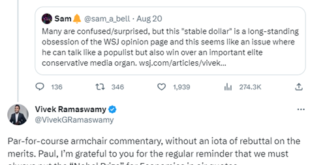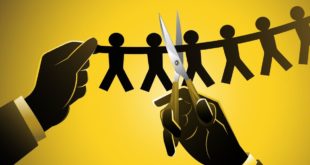Homeless foreign nationals (i.e., "illegal aliens") began arriving last week at a makeshift shelter in a Staten Island neighborhood. The arrivals come after New York City Mayor Eric Adams decided that a shuttered Catholic school on Staten Island would be used to house some of the more than 100,000 migrants who have arrived in New York City since the spring of 2022. Staten Islanders, however, were given no veto and no role in determining the location of the shelter...
Read More »Physician Burnout: Another Consequence of Medical Socialism
According to the American Medical Association, physician burnout “is a long-term stress reaction which can include the following: Emotional exhaustionDepersonalization (i.e., lack of empathy for or negative attitudes toward patients)Feeling of decreased personal achievement”The article goes on to say: Physician burnout is an epidemic in the U.S. health care system, with nearly 63% of physicians reporting signs of burnout such as emotional exhaustion and...
Read More »Easy Money Is a Much Bigger Economic Problem than Debt
While many economists claim that high overall debt levels can lead to economic recessions, irresponsible government spending and money expansion are the real culprits. Original Article: "Easy Money Is a Much Bigger Economic Problem than Debt" [embedded content] Tags: Featured,newsletter
Read More »Totalitarian Ideals and Not Living by Lies
On we go, further and further into the era of post-journalism, where outlets survive not on the accuracy and honesty of their reporting but on the appeal of their narrative. —Fred Skulthorp, The Critic Nobody has missed that the West suffers from a credibility problem. Its institutions—by which we mean the media, government officials, academia, teachers’ unions and other joint societal “stuff” —hold less and less of our collective trust (business excepted, it seems)....
Read More »Politics Has Infected Everything in Our Society, Especially the Media
Modern American media has become so politicized that a once-venerable institution now cannot be trusted. Original Article: "Politics Has Infected Everything in Our Society, Especially the Media" [embedded content] Tags: Featured,newsletter
Read More »Breaking Free: How Open Protocols Foster Entrepreneurship, Spontaneous Order, and Individual Sovereignty
The open protocols on the internet would seem to create chaos, but it turns out that they produce the opposite results, encouraging a digital spontaneous order. Original Article: "Breaking Free: How Open Protocols Foster Entrepreneurship, Spontaneous Order, and Individual Sovereignty" [embedded content] Tags:...
Read More »Voting with Their Feet: The Lure of Migration
People migrate for many reasons, including moving to a better economy and escaping political persecution. But one thing is certain: people are going to vote with their feet. Original Article: "Voting with Their Feet: The Lure of Migration" [embedded content] Tags: Featured,newsletter
Read More »Navigating by the Stars on a Cloudy Night
In this episode, Mark examines Fed Chairman Jay Powell's recent confession that the Fed is "navigating by the stars on a cloudy night." This reveals the fundamental methodological weakness of the Fed's economic policy and mainstream economics in general ("data dependency"). In contrast, it also reveals the strengths of Austrian economics, economic theory, and the self regulation of the free market. Mark suggests that we all be prepared for big negative surprises in...
Read More »Why Stabilization Policy is Destabilizing
U.S. presidential candidate Vivek Ramaswamy took aim at the Federal Reserve recently: The reality is, if the dollar is volatile, it’s as bad as if the number of minutes in an hour fluctuated. None of us would be here at the same time. […] When the number of dollars [in relation] to a unit of gold or an agricultural commodity is wildly fluctuating, money doesn’t go to the right projects. It’s just wild—it doesn’t make any sense. That’s been an impediment to economic...
Read More »Why the “Just Wage” Theory Doesn’t Make Much Sense
The concept of the "fair wage" or the "just wage" is centuries old. It dates back at least to the Middle Ages and was founded on the idea that "just" prices of goods must be sufficient to provide "a reasonable wage to maintain the craftsman or merchant in his appropriate station of life." In its modern form, the idea of the just wage is often known as a "living wage." But whatever its form, the notion comes down to the idea that an employer must pay his workers a...
Read More » Swiss Economicblogs.org
Swiss Economicblogs.org





